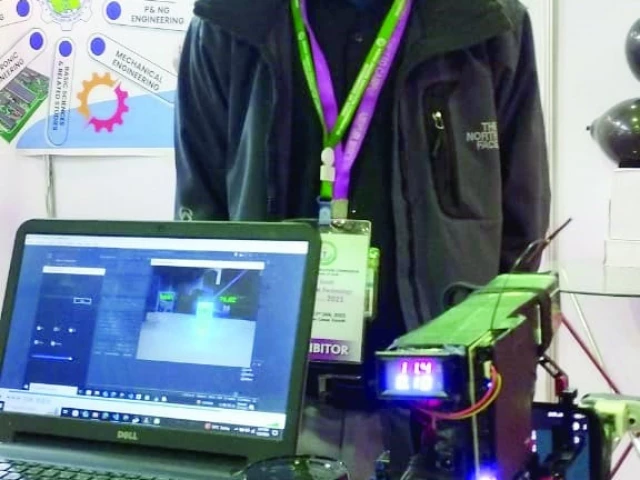Students develop AI-powered robo-vehicle
Prototype equipped with advanced laser gun capable of incinerating targets

Artificial Intelligence is the new buzzword in today's technological world. It's fast changing the world we knew until now. Last week, the Indian military introduced its four-legged, AI-powered robots, which were proudly showcased as part of its Army Day parade in Pune city. Called MULES (Multi-Utility Legged Equipment) and designed to resemble dogs, these "AI-canines" will be used for surveillance as well as to transport light loads.
Over in Karachi, university students have unveiled an AI-powered robot vehicle designed to enhance Pakistan's defence capabilities.
Equipped with an advanced laser gun capable of incinerating targets in seconds, this next-gen system promises to revolutionise military operations while minimising both costs and casualties.
The AI-powered robo-vehicle, currently in prototype form, has been developed to minimise casualties among security personnel by offering a safer, more efficient alternative to traditional combat methods.
Its ability to distinguish between friendly and enemy forces, together with its precise targeting of both moving and stationary targets - on land and in the air - shows impressive accuracy and efficacy.
The developers of the robo-vehicle, students from Mehran University of Engineering & Technology, Shaheed Zulfiqar Ali Bhutto Campus in Khairpur, proudly showcased their product at the 4th Research and Technology Showcase at the Karachi Expo Centre, where it captured the attention of everyone, including Sindh's chief minister, who appreciated the project as a leap forward in defence technology.
Four developed nations - Israel, the US, the UK, and South Korea - have already incorporated similar technology into their defence systems, and if implemented, Pakistan would become the first country in the Islamic world to deploy such technology, positioning it as the 5th nation globally to do so.
Syed Owais Ahmed, a student from MUET's Department of Electronics at the Khairpur Campus, explained that the prototype robot laser gun offers an alternative to conventional ballistic weapons. One of the major advantages of this system is its ability to fire laser beams at the speed of light, eliminating the need for traditional ammunition. Powered by a hybrid electric setup, the system ensures an unlimited supply of "ammunition," making it highly reliable in combat situations. Moreover, this innovation could reduce the risk of casualties by enabling remote control of the system from a safe workstation.
The prototype is equipped with high-tech features, including cameras, infrared sensors, and a range of lenses to enhance its targeting capabilities. Currently, the system can target objects up to six feet away, but the range can be extended with additional modules. This could potentially enable the system to disable enemy missiles mid-air during an airstrike.
The students and faculty behind this project are eager to contribute their expertise to strengthen the country's defence capabilities. Beyond providing enhanced security, this technology could lower defence expenditures by reducing reliance on conventional ammunition and personnel in dangerous combat situations. This technological marvel - once viewed as the realm of science fiction - now stands as a testament to the ingenuity and determination of Sindh's brightest minds.


















COMMENTS
Comments are moderated and generally will be posted if they are on-topic and not abusive.
For more information, please see our Comments FAQ